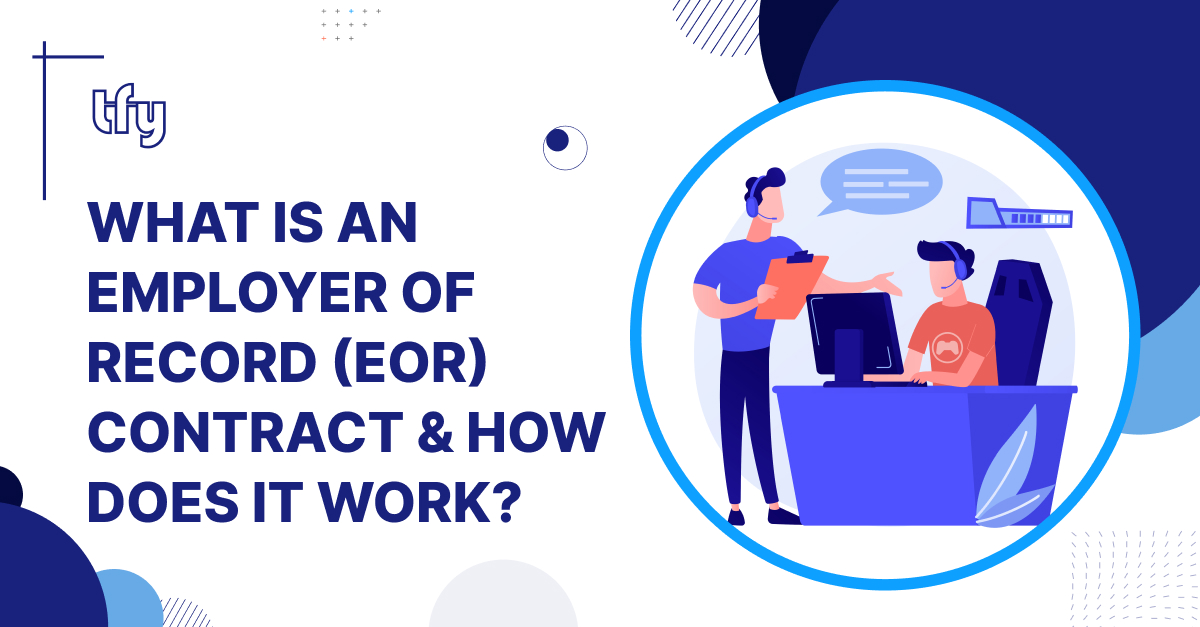
As businesses embrace a more borderless world of work, hiring international talent is no longer a distant goal—it’s a competitive necessity. But while expanding globally opens exciting opportunities, it also comes with legal, HR, and tax complexities that can stall progress.
Enter the Employer of Record (EOR) model—a powerful solution that allows companies to legally hire across borders without setting up a local entity or wading through compliance minefields.
In this guide, we’ll unpack how EOR contracts work, what they should include, and how they support your global hiring goals with confidence and clarity.
What Is an Employer of Record (EOR) Contract?
An EOR contract is a formal agreement between your business and an Employer of Record provider. This contract outlines who handles what—especially when it comes to legal responsibilities like:
- Managing payroll and benefits
- Complying with local employment laws
- Filing taxes and HR documentation
- Acting as the legal employer in the worker’s country
You still lead your team’s day-to-day operations. The EOR, however, is responsible for ensuring all employment obligations are met legally in the employee’s jurisdiction.
According to ANSR, which analyzes the Employer of Record vs. PEO decision-making process, EOR contracts can reduce legal risk and simplify international hiring without entity setup.
Why Use an EOR Contract?
1. Reduce Legal Risk When Hiring Internationally
Every country has its own employment laws and compliance standards. EOR contracts let you hire in new markets without registering a local legal entity—minimizing your exposure to fines or misclassification issues.
2. Expand Faster with Less Red Tape
EOR providers streamline the hiring process. Instead of spending months setting up infrastructure, you can onboard talent in a matter of weeks—ideal for startups and global teams that move fast.
3. Build Trust Through Local Compliance
Your international team benefits from contracts that align with their country’s laws, while your finance and HR teams gain peace of mind knowing taxes and benefits are properly handled.
A detailed analysis from Deloitte emphasizes that cross-border remote work brings complex tax, payroll, and visa compliance requirements, which can expose businesses to significant risk if left unmanaged. According to Deloitte, it’s critical to establish risk thresholds and governance around international hiring to safeguard both legal and financial integrity.
Common Structures of EOR Contracts
Tripartite Agreements
This setup involves three signatures: your company, the EOR provider, and the employee. It’s less common but necessary in some jurisdictions.
Bipartite Agreements + Local Employment Contracts
The most widely used format:
- You and the EOR sign a service agreement
- The EOR signs a separate employment contract with the worker
This creates a compliant relationship across the board, without direct legal entanglement for your business.
What to Include in an EOR Contract
1. Scope of Services
- Define exactly what the EOR is responsible for, such as:
- Recruitment and onboarding
- Payroll and benefits administration
- Compliance with labor laws
- Exit and termination processes
2. Clear Division of Roles
Make sure it’s clear who does what:
- You manage team performance and projects
- EOR handles taxes, statutory leave, and employment records
According to SHRM, an Employer of Record can legally hire, pay, and manage a company’s international employees—helping businesses navigate foreign labor law complexities and ensure cost transparency in global hiring
3. Data Privacy & Confidentiality
With access to sensitive personal and company data, the EOR must follow GDPR or local privacy laws. Ensure your contract includes:
- Data security protocols
- Breach notification timelines
- How long data is stored
A Cisco 2024 Data Privacy Benchmark Study reveals that 95% of organizations report the benefits of privacy investments exceed their cost, with average returns of 1.6× the spend. The research also found that 94% of organizations report privacy-related metrics to their board, underscoring how privacy is no longer just regulatory—the latest driver of customer trust and competitive advantage
4. Transparent Pricing
Common fees may include:
- Per-employee costs
- Onboarding/offboarding charges
- Currency conversion fees
- Early-exit penalties or deposit requirements
Tip: Ask for a detailed pricing structure to avoid surprise costs mid-contract.
Legal Protections to Include
Dispute Resolution
Specify which country’s courts handle disputes. For example, if you’re based in the U.S. but your employee is in Germany, disputes should be settled under German labor law.
Liability & Indemnity
Clearly assign responsibility for issues like payroll mistakes, misfiled taxes, or wrongful termination claims.
Termination Terms
Outline how and when each party can exit the contract—both between you and the EOR and between the EOR and the employee.
Common Challenges When Drafting EOR Contracts
- Clarifying who manages performance or workplace expectations
- Ensuring pricing is transparent and predictable
- Balancing operational flexibility with legal certainty
These challenges can be overcome with proactive communication, regular contract reviews, and clearly defined escalation processes.
Alternatives to EORs
While EORs are often the most flexible option, consider these alternatives:
- Freelancers: Quick and low-commitment, but come with misclassification risks
- Setting Up a Legal Entity: Offers full control but is costly and time-consuming
- Local Employer Registration: Suitable for select countries where a partial presence is needed
Transformify (TFY) offers a great comparison if you’re weighing your options.
Why a Solid EOR Contract Is Key to Global Success
Expanding internationally should feel exciting—not overwhelming. A well-structured EOR contract keeps your growth on the right side of compliance, while empowering you to focus on what matters: building great teams across the globe.
At Transformify (TFY), we specialize in helping companies scale across borders without the complexity. From evaluating EOR partners to negotiating agreements, we’re here to support your journey to global growth.
✨ Need help navigating your EOR options? Book a demo with Transformify —we’ll help you hire smarter, faster, and more compliantly.



